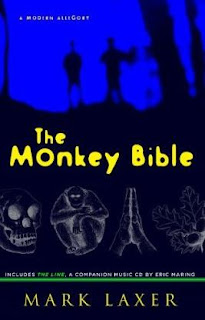---
Sex in the Bible
"There's sex in the Bible-in The Monkey Bible-and the comments I've thus far received about it has got me thinking.
"One thoughtful educator wrote this: "I'm a little concerned about how Emmanuel's sexual fantasy about Lucy, the Australopitecine, will be received (especially since it occurs on the second page and before we have a chance to feel connected with Emmanuel), as well as the one-nighter with the woman from the airline. I know that sex sells, but we wouldn't be able to recommend the book to, say, high school teachers for their students. Might there be a work-around to this?"
"To which I responded: "I hear you about the sexual references within The Monkey Bible. Some number of pastors, who have provided wonderful endorsements, privately mentioned that they were reluctant to share the book with younger folks in their flocks for similar reasons as you mention. If you will indulge me, though, the book is an honest exploration of the line separating humans from all other creatures. In writing the book, I was not thinking about markets or whom I might or might not offend. Nor was I intending to introduce sex at all. The characters, after I was some years into the writing, in a sense helped define themselves and the sexual parts surprised me...
"I've spent a great deal of time pondering what I've written and what might be edited in or out (as has my editor!!!). The writing and rewriting has taken place over the course of 10 years. Emmanuel is not a sexual monster and his desires, I feel, take up a small part of the book. He is a moral character and he loves his friends and cares for them and to my way of thinking, he's as befuddled as most people are, about sexuality. And yet, particularly as he explores his "animal nature," sexuality is something which, if he is honest about it, is an integral part of his psyche which strikes me as a good thing. Without it, of course, most life on earth would die in a generation. It seems there is a good reason--good for society and good for young people to gently explore--for the existence of desires and fantasies. If Emmanuel becomes awash in such desires, if he loses control, if he hurts people, then it would be the wrong message to share with young people but I don't feel that that is the case here.
"If you feel the book is inappropriate for certain age groups, I certainly respect that. I do wonder though, in today's society, what 13 and 14 year olds have access to on the internet and I have the sense that, frankly, what people are exposed to within The Monkey Bible is fairly tame.
"In summary, I'm not sure how to craft a work-around, nor am I convinced that a high-school version would be effective or particularly helpful...Perhaps one work-around is to suggest that the book is best targeted for college-aged people and older...?"
---
Thank you, Mark, for that insight!
And Readers, if you haven't already, make sure you check out my review of The Monkey Bible here.









